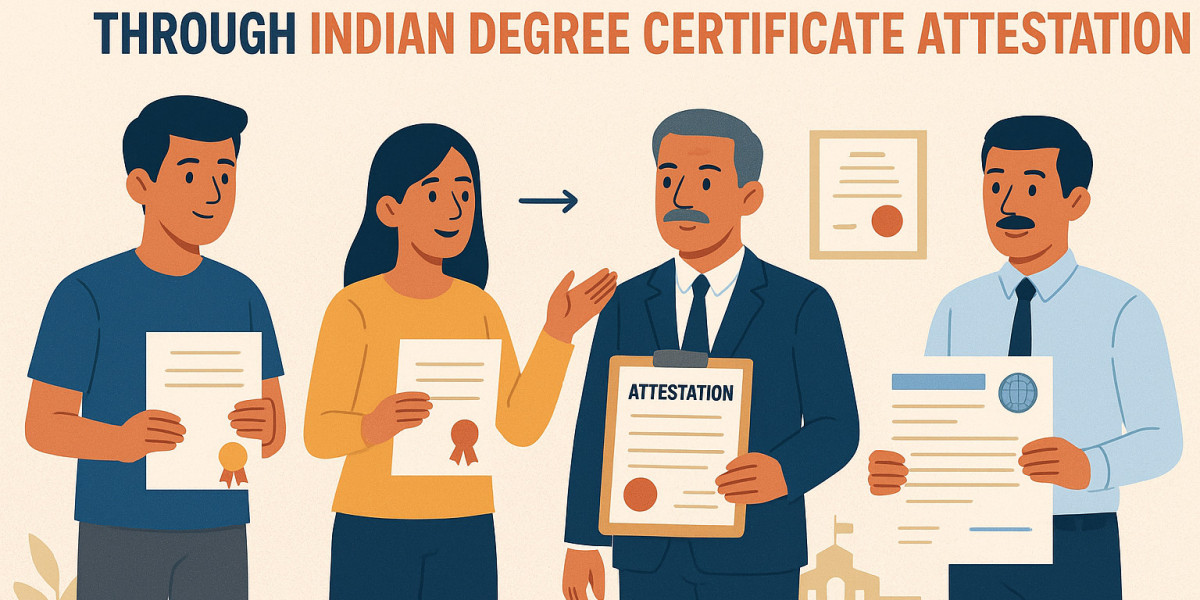When students and professionals seek opportunities abroad—whether for higher education, employment, or migration—their qualifications and personal documents must be recognized by foreign authorities. One of the most important steps in this process is Indian degree certificate attestation. Specifically, Indian degree certificate attestation is a formal verification process that proves the authenticity of an academic qualification issued in India so it can be accepted in another country. Without this verification, many individuals face rejection of visa applications, refusal of admission in universities, or denial of employment opportunities abroad.
This article explains, in detail, how to verify and authenticate documents through Indian degree certificate attestation. It will cover what attestation means, why it is needed, the step-by-step procedure, the different authorities involved, challenges faced, and valuable insights to ensure a smooth attestation journey.
Understanding Document Attestation
Document attestation is the process of validating the genuineness of a document by an authorized authority. In the case of degree certificates, attestation involves government departments, universities, embassies, and sometimes private agencies, each verifying the signature, seal, or authenticity of the document at different stages. The final outcome is a certificate recognized internationally.
For instance, if a student with an Indian engineering degree wants to work in the UAE, the UAE government will only recognize the degree after it has been authenticated by Indian authorities and further attested by the UAE embassy or consulate in India. This ensures that the degree is not forged, fake, or misrepresented.
Why Indian Degree Certificate Attestation is Important
The significance of Indian degree certificate attestation lies in the fact that foreign authorities need assurance that a certificate is valid. Some of the main reasons include:
Employment Abroad: Most employers abroad, particularly in the Middle East, demand an attested degree certificate before finalizing job contracts. This prevents fraudulent qualifications from entering their workforce.
Higher Education: Universities overseas require attested academic credentials for admissions into postgraduate or professional programs.
Migration and Residency: Immigration departments in countries like Canada, Australia, and the UAE may require attested degrees to grant visas or permanent residency.
Professional Licensing: Certain professions such as engineering, teaching, nursing, or medicine require licensing abroad, for which attested degrees are mandatory.
Legal Validity: Attestation ensures that the document holds legal value in another jurisdiction and is not merely treated as an unsupported claim.
Without attestation, even the most prestigious Indian degree may be invalid outside the country.
Types of Attestation Required for Indian Degrees
Depending on the destination country, the following types of attestations may be required:
Notary Attestation: Conducted at the local level, usually by a notary public, to confirm that the document is legitimate.
State Government Attestation: Typically, the State Education Department or the Home Department validates the certificate before forwarding it for central attestation.
HRD Attestation (Human Resource Development): This is done by the Ministry of Human Resource Development (HRD), which verifies educational documents directly from the university or board that issued them.
MEA Attestation (Ministry of External Affairs): The central government, through MEA, authenticates the document for use abroad.
Embassy/Consulate Attestation: The foreign embassy or consulate of the destination country in India attests the document.
MOFA Attestation (Ministry of Foreign Affairs, Destination Country): Finally, some countries require attestation again from their Ministry of Foreign Affairs once the individual arrives.
Each of these steps adds a layer of credibility to the document.
Step-by-Step Process of Indian Degree Certificate Attestation
The process may seem complex, but breaking it down step by step makes it easier to understand:
Step 1: Verification from the University or Board
The journey begins at the source—the university or educational board that issued the degree. The institution verifies the authenticity of the certificate, confirming it was legitimately awarded to the individual. This is crucial because without university confirmation, subsequent attestation authorities will not proceed.
Step 2: Notary Attestation
The next step is local notary attestation. The notary public verifies the certificate, stamping and signing it as authentic. This is a preliminary verification step.
Step 3: State HRD or Home Department Attestation
Educational certificates generally go through the HRD department of the respective state. This department liaises with universities to validate the academic record. If the certificate is personal or non-educational, the state Home Department is involved instead.
Step 4: Ministry of External Affairs (MEA) Attestation
After state-level attestation, the certificate moves to the MEA, which is the central authority responsible for authenticating all documents for international use. The MEA attestation is mandatory before foreign embassies can step in.
Step 5: Embassy or Consulate Attestation
The attested degree is then sent to the embassy or consulate of the destination country in India. This step ensures that the country officially acknowledges the certificate. For example, the Saudi Embassy, UAE Embassy, or Qatar Embassy each has specific requirements and processes for attestation.
Step 6: MOFA Attestation Abroad
In certain countries, including most Gulf nations, the Ministry of Foreign Affairs in the host country further verifies the document after the individual arrives. This final stamp of approval makes the certificate fully valid for all official and legal purposes in the destination country.
Common Challenges Faced During Attestation
Though the process seems straightforward, many applicants encounter hurdles that delay or complicate attestation. Some of the most common challenges include:
Mismatch in Details: Differences in name spellings between the degree certificate and passport can cause rejections.
Lost or Damaged Certificates: Missing original documents lead to delays, as replacements must be issued by the university.
University Delays: Some universities take weeks to confirm authenticity, leading to extended waiting periods.
Lack of Clarity on Requirements: Each country has unique rules, and applicants often get confused about which attestations are mandatory.
Fraudulent Agents: Unscrupulous agencies sometimes exploit applicants by charging high fees or providing fake attestations.
Awareness of these issues helps individuals prepare in advance and avoid unnecessary setbacks.
How to Ensure Smooth Degree Certificate Attestation
To overcome the challenges, applicants can follow certain best practices:
Double-Check Documents: Ensure all personal and academic details match across certificates, passport, and other IDs.
Start Early: Begin the process several months before deadlines, as attestation can take time.
Work with Authorized Agencies: Choose government-approved or reputed attestation agencies to avoid fraud.
Keep Originals Safe: Always carry original certificates and a set of photocopies for submission.
Stay Updated: Embassy and consulate requirements change occasionally, so checking official websites or contacting them directly is wise.
Role of Professional Attestation Services
While it is possible to complete the process independently, many people prefer to use professional attestation services. These agencies specialize in handling paperwork, liaising with authorities, and reducing the applicant’s burden. They provide:
Door-to-door collection and delivery of documents.
Real-time status tracking.
Knowledge of country-specific requirements.
Time-saving solutions for applicants with busy schedules.
However, it is crucial to verify that the service provider is authorized and has a good track record.
Attestation vs Apostille: What’s the Difference?
Some applicants confuse attestation with apostille. Though both validate documents, the difference lies in the countries involved.
Apostille: Valid only between member countries of the Hague Apostille Convention. Documents receive a single certification (apostille) from the MEA and are accepted directly abroad.
Attestation: Required for non-apostille countries. It involves multiple layers of verification, including embassy attestation.
For example, if you are migrating to France, apostille may suffice. But for UAE or Saudi Arabia, full attestation is mandatory.
Real-Life Example of Indian Degree Certificate Attestation
Consider an IT professional from Bangalore who secures a job in Dubai. The employer requests an attested degree certificate before issuing a work visa. The professional begins the process by having his degree verified by his university, then approaches the Karnataka HRD department for authentication. After this, the certificate is forwarded to the MEA for central attestation. The final step is UAE Embassy attestation in New Delhi. Upon arrival in Dubai, the certificate is further authenticated by the Ministry of Foreign Affairs in the UAE. Only after this is the professional’s degree recognized officially for employment.
This example highlights how the process involves multiple stakeholders but ultimately ensures transparency and authenticity.
The Future of Document Attestation
With digital transformation, document attestation is also evolving. Many Indian universities are adopting digital verification systems, making the process faster and more secure. Blockchain-based solutions are also being explored to eliminate fraud and reduce manual intervention.
Moreover, some foreign governments are collaborating with Indian authorities to enable electronic verification, which could one day replace the lengthy physical attestation chain.
Conclusion
Indian degree certificate attestation is more than just a bureaucratic formality—it is a gateway to international opportunities. From employment in foreign countries to admission in global universities, this process ensures that an individual’s hard-earned academic credentials are legally recognized abroad. While the journey may seem tedious, understanding the step-by-step procedure, preparing documents carefully, and choosing reliable attestation channels can make the experience smooth and hassle-free.
As globalization continues, document attestation remains a vital bridge between Indian qualifications and international recognition. By approaching the process with awareness and preparation, students and professionals can confidently take their ambitions beyond borders.








